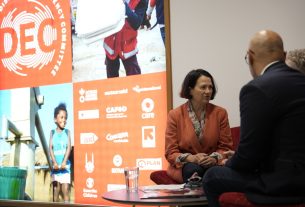|
Getting your Trinity Audio player ready...
|
- This global round-up brings you health stories from the past fortnight.
- Top health news: Scientists race to investigate highly mutated coronavirus variant; America’s drinking water contaminated with toxic chemicals; Air pollution a major risk to life expectancy in South Asia.
1. Scientists investigate risks of highly mutated coronavirus
Research is underway to determine the risks posed by a new form of coronavirus that has been found around the world. The variant has been detected by several laboratories and appears to be rare, but it is significantly different from other strains currently in circulation.
Although there is no immediate cause for concern, the differences were notable enough to catch scientists’ attention, as they may make it easier for the virus to evade people’s existing immunity. The omicron variant that emerged in late 2021 was also significantly different from other strains in circulation and led to another wave of infection.
The World Health Organization has designated the mutated form as a variant under surveillance. The Centers for Disease Control and Prevention in the US says that existing tests and treatments appear to be effective against the strain.
2. Toxic ‘forever’ chemicals discovered in US drinking water
Toxic chemicals have been found in the drinking water of millions of people across the US, according to testing data released by the country’s Environmental Protection Agency.
“Forever chemicals” – a group of extremely long-lasting compounds found in a variety of products, also known as per- and polyfluoroalkyl substances (PFAS) – have been detected in the water supplies of as many as 26 million Americans.
PFAS have been shown to lead to health problems including liver damage, thyroid disease, obesity, fertility issues and cancer.
The World Economic Forum’s Centre for Health and Healthcare works with governments and businesses to identify and amplify solutions for building resilient, efficient, and equitable healthcare systems. Here are some examples of the impact delivered by the centre:
Global vaccine delivery: The Forum actively supports global vaccine delivery efforts, and its contributions to COVAX have resulted in the delivery of over 1 billion COVID-19 vaccines. The Forum also played a pivotal role in launching Gavi, the Vaccine Alliance, which has helped save more than 13 million lives over the past 20 years.
Davos Alzheimer’s Collaborative: Through this collaborative initiative, the Forum is actively working to accelerate progress in the discovery, testing, and delivery of interventions for Alzheimer’s disease.
Mental health policy toolkit: In collaboration with Deloitte, the Forum has developed a comprehensive toolkit to assist lawmakers in crafting effective policies related to technology for mental health.
COVID Action Platform: In the midst of the pandemic, the Forum, in partnership with various organizations, launched more than 40 initiatives worldwide to navigate the challenges posed by COVID-19.
Global Coalition for Value in Healthcare: The Forum’s coalition is fostering a sustainable and equitable healthcare industry. It has launched innovative value-based healthcare hubs to address ineffective spending on global health.
UHC2030 Private Sector Constituency: Hosted by the Forum, the constituency plays a crucial role in advocating for universal health coverage and emphasizing the private sector’s potential to contribute to achieving this ambitious goal.
To get involved or to learn about other initiatives undertaken by the World Economic Forum, please contact us.
3. News in brief: More health stories from around the world
Air pollution remains the biggest external risk to human health, but its impact is unequally spread worldwide. In Bangladesh, India, Pakistan, China, Nigeria and Indonesia, people’s life expectancy is reduced by one to more than six years because of the air they breathe, the University of Chicago’s Energy Policy Institute said in its latest Air Quality Life Index. Many of the countries most affected by air pollution lack the tools to create air quality improvements, the report says.
An improved diet, eating less red meat, reading and doing more sports can boost children’s reasoning skills in their first two school years. Researchers from the University of Eastern Finland found that children with healthier eating habits, who read more and participated in organized sports, showed greater cognitive development than their peers.
Adults in the US who regularly say “hello” to their neighbours are more likely to have higher well-being than those who greet fewer or no neighbours. Americans’ well-being score increases by the number of neighbours greeted, up to a maximum of six people, according to a Gallup survey.
4. More on health from Agenda
The secret to a long and happy life is in our relationships with other people, it seems. People with strong relationships live longer, and they’re happier and healthier too, according to a study by scientists at Harvard over the course of 85 years.
Cyber attacks on healthcare settings have the potential to put lives at risk. Culture, endpoint protection and access control are three key ways of helping prevent them.
Providing accessible and quality care is a significant challenge for India’s healthcare system, particularly in rural areas like Madhya Pradesh. Digital dispensaries could help bridge the healthcare gap and enable underserved communities to quickly access care.


